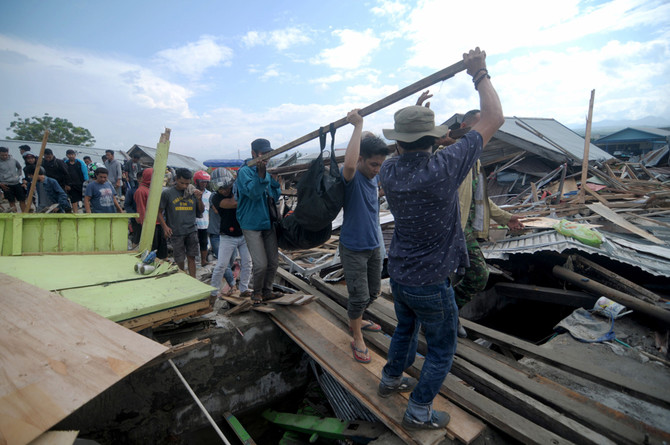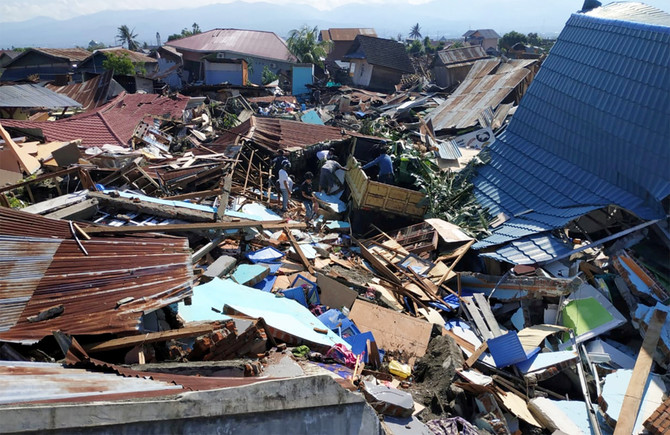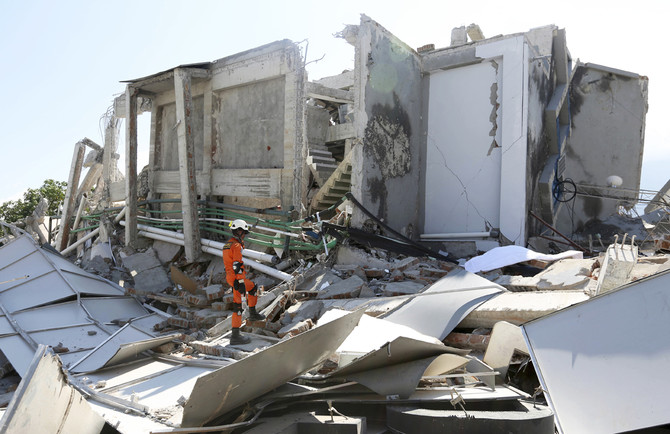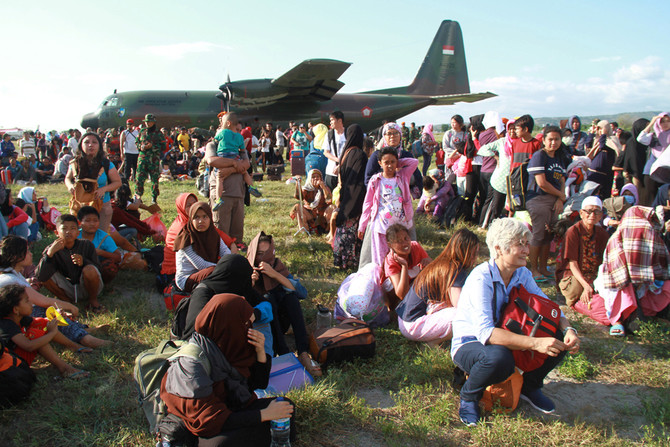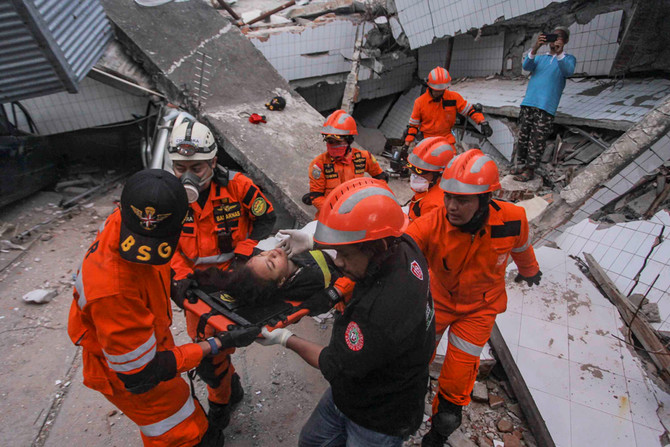PALU, Indonesia: The confirmed death toll from a 7.4-magnitude earthquake and a subsequent tsunami that hit Indonesia’s central Sulawesi province rose to 832 on Sunday. Most of the casualties were from Palu, the provincial capital and one of the hardest-hit areas.
Indonesia’s National Disaster Mitigation Agency (BNPB) said 821 of the casualties were from Palu and 11 from neighboring Donggala district. Officials feared the figure could rise to more than 1,000, judging from past experience handling the tsunami that hit Aceh in 2004.
“It is expected the number of victims will continue to rise as many of them are still unidentified, trapped under collapsed buildings and in areas that rescuers still can’t reach,” BNPB spokesman Sutopo Purwo Nugroho said.
Nugroho added that 71 foreigners from nine countries were affected by the disaster that hit the province on Friday, but most of them are safe and have been accounted for. More than half of the foreigners are from Thailand and China but they have been reported safe, while three French and one Malaysian are still unaccounted for.
“A South Korean national is thought to have been in Roa-Roa Hotel in Palu which collapsed in the earthquake,” Nugroho said.
Rescue personnel are still searching for victims under the hotel debris, where it is estimated up to 60 people have been buried under the ruins and those beneath the rubble of shopping malls, residential houses and many other damaged buildings in the city as well as those who were swept away from Talize Beach.
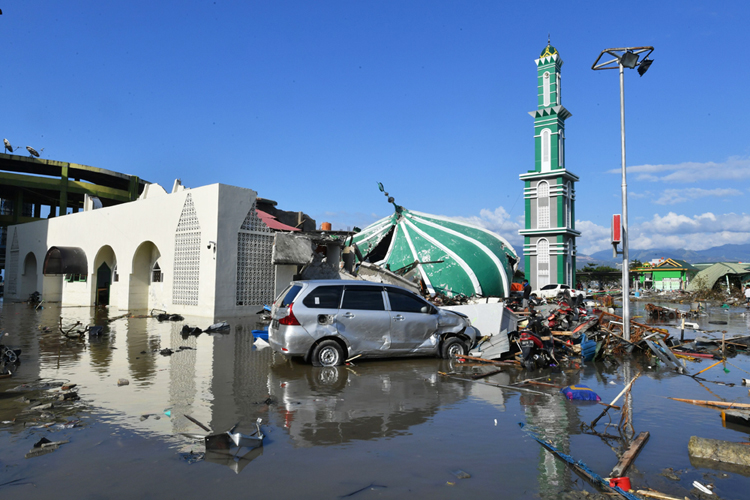
A collapsed mosque is seen amid waters from a tsunami surge in Palu, Central Sulawesi on Sept. 30, 2018. (AFP/ADEK BERRY)
Most the victims died after they were hit by rubble of buildings damaged in the quake and the tsunami, and they will be buried after they have been identified through face recognition and fingerprints, Nugroho said.
“We will start burying victims in mass graves today to avoid any diseases,” he said.
Nugroho said aftershocks continue to rock the area with at least 209 recorded until Sunday.
President Joko Widodo on Sunday visited Palu’s Balaroa residential complex, which has been severely damaged in the quake.
“I have instructed all relevant government bodies that first and foremost we must put priority on evacuation,” Widodo said.
He called on the distressed residents to remain calm and told them that humanitarian assistance was on the way despite the damaged access to the affected areas and communication network.
The disaster agency has said that essential aircraft can land at Palu’s airport, though AirNav, which oversees aircraft navigation, said the runway was cracked and the control tower damaged.
AirNav said one of its air traffic controllers, aged 21, died in the quake after staying in the tower to ensure a flight he’d just cleared for departure got airborne safely. It did.
More than half of the 560 inmates in a Palu prison fled after its walls collapsed during the quake, said its warden, Adhi Yan Ricoh.
“It was very hard for the security guards to stop the inmates from running away as they were so panicked and had to save themselves too,” he told state news agency Antara.
Ricoh said there was no immediate plan to search for the inmates because the prison staff and police were consumed with the search and rescue effort. “Don’t even think to find the inmates. We don’t even have time yet to report this incident to our superiors,” he said.
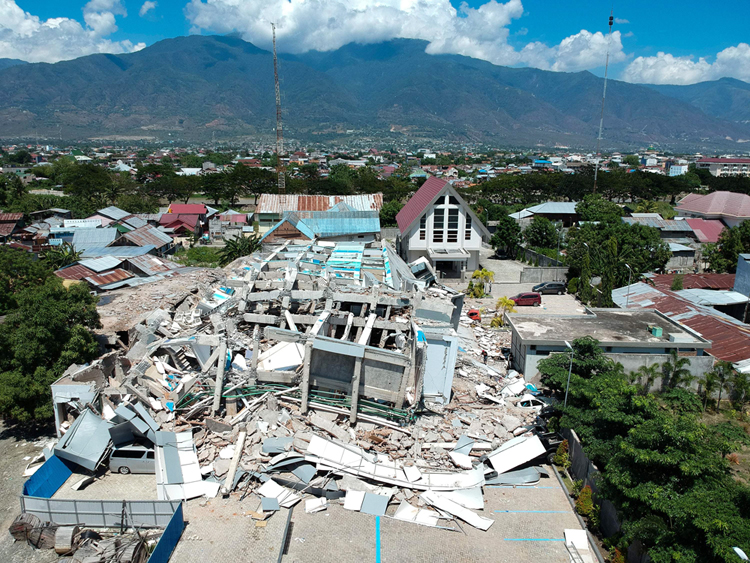
This aerial picture shows the debris of a ten-story hotel demolished by an earthquake on Sept. 28, 2018 in Palu, Central Sulawesi. (AFP)
Cries for help from trapped people heard
Muhammad Syaugi, the head of Indonesia’s search and rescue agency, said that he could hear people calling out from the collapsed eight-story Roa-Roa Hotel in the hard-hit city of Palu on the island of Sulawesi.
“I can still hear the voice of the survivors screaming for help while inspecting the compound,” he said, adding there could be 50 people trapped inside.
The nearby cities of Donggala and Mamuju were also ravaged, but little information was available due to damaged roads and disrupted telecommunications. Nugroho said “tens to hundreds” of people were taking part in a beach festival in Palu when the tsunami struck at dusk on Friday. Their fate was unknown.
Hundreds of people were injured and hospitals, damaged by the quake, were overwhelmed.
Some of the injured, including Dwi Haris, who suffered a broken back and shoulder, rested outside Palu’s Army Hospital, where patients were being treated outdoors due to continuing strong aftershocks. Tears filled his eyes as he recounted feeling the violent earthquake shake the fifth-floor hotel room he shared with his wife and daughter.
“There was no time to save ourselves. I was squeezed into the ruins of the wall, I think,” said Haris, adding that his family was in town for a wedding. “I heard my wife cry for help, but then silence. I don’t know what happened to her and my child. I hope they are safe.”
It’s the latest natural disaster to hit Indonesia, which is frequently struck by earthquakes, volcanic eruptions and tsunamis because of its location on the “Ring of Fire,” an arc of volcanoes and fault lines in the Pacific Basin. In December 2004, a massive magnitude 9.1 earthquake off Sumatra island in western Indonesia triggered a tsunami that killed 230,000 people in a dozen countries. Last month, a powerful quake on the island of Lombok killed 505 people.
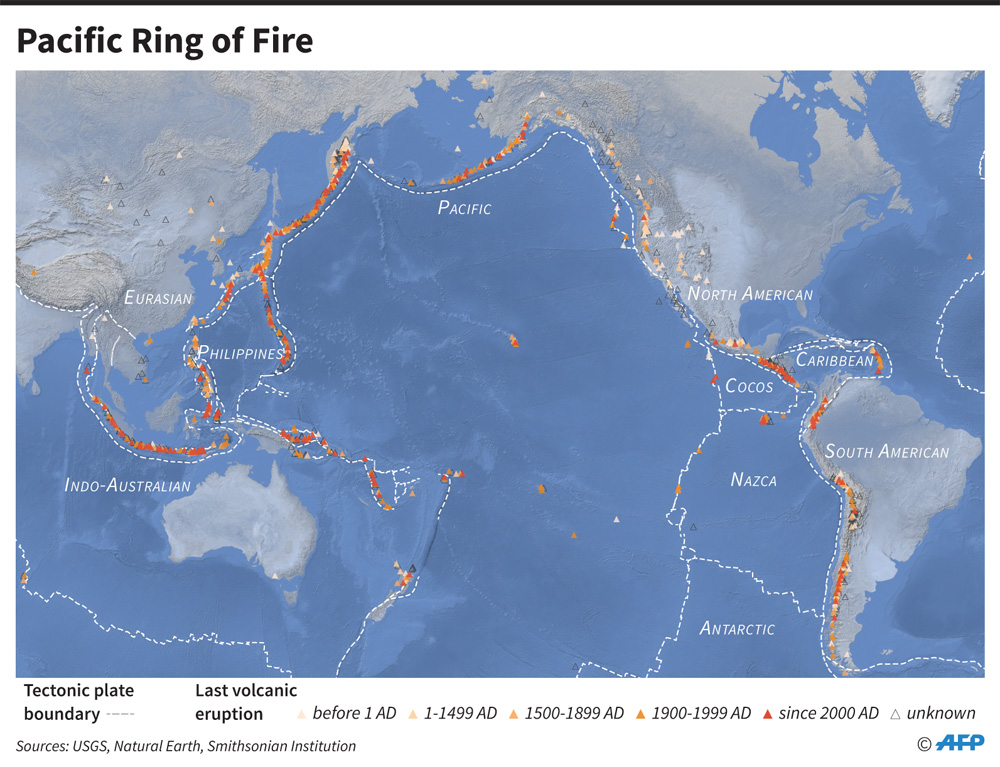
Palu, which has more than 380,000 people, was strewn with debris from the earthquake and tsunami. A mosque heavily damaged by the quake was half submerged and a shopping mall was reduced to a crumpled hulk. A large bridge with yellow arches had collapsed. Bodies lay partially covered by tarpaulins and a man carried a dead child through the wreckage.
The city is built around a narrow bay that apparently magnified the force of the tsunami waters as they raced into the tight inlet.
Indonesian TV showed dramatic smartphone video of a powerful wave hitting Palu, with people screaming and running in fear. The water smashed into buildings and the mosque.
Indonesia is a vast archipelago of more than 17,000 islands that’s home to 260 million people. Roads and infrastructure are poor in many areas, making access difficult in the best of conditions.
(With AP & Reuters)


